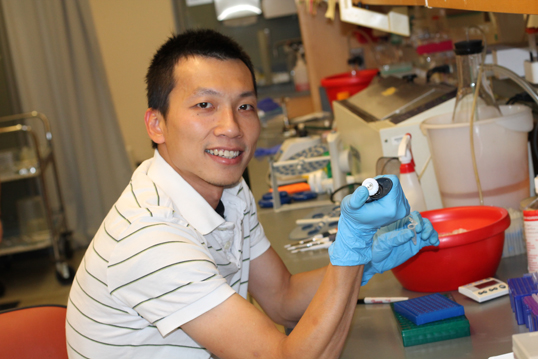
Tsung-Han ‘Stanley’ Hsieh “is a remarkable young scientist with a ‘perfect storm’ of outstanding technical skills, a keen and disciplined approach to troubleshooting, exceptional intellectual firepower, and an unusually deep and mature grasp of the scientific literature,” according to his mentor, Oliver Rando, MD, PhD.
Graduate School of Biomedical Sciences student Tsung-Han “Stanley” Hsieh is among the 46 international pre-doctoral students selected by the Howard Hughes Medical Institute to receive International Student Research Fellowships that will support them as they complete their graduate studies at U.S. universities. The highly competitive award is funded at $43,000 per year for up to three years.
HHMI created the program because it recognized a problem: International students in U.S. graduate schools often have difficulty getting funding to support their studies. For example, they are not eligible for federal fellowships or training grant support, or other governmental opportunities that are generally reserved for U.S. citizens. HHMI chose to fund the third to fifth years of graduate school, because by this time most students have chosen an advisor, identified a research project and demonstrated their potential for success in the lab.
“The best science often arises at intersections—between traditional disciplines, among cultures and across national borders,” said David J. Asai, senior director in science education at HHMI. “As these students engage in leading edge science, they are also living the international collaboration of discovery.”
Hsieh, who is from Taiwan, is studying in the lab of Oliver Rando, MD, PhD, professor of biochemistry & molecular pharmacology. Hsieh is researching the fine-scale of chromatin structure, which he says has been “an unsolved puzzle for a century.”
“Stanley is a remarkable young scientist with a ‘perfect storm’ of outstanding technical skills, a keen and disciplined approach to troubleshooting, exceptional intellectual firepower, and an unusually deep and mature grasp of the scientific literature,” said Dr. Rando, who serves as Hsieh’s mentor and nominated him for the award. “He joined the lab a little over a year ago, and during that time managed to develop a chromosome folding assay that many of the best people in my lab had tried to develop for about a year each before giving up. Stanley has solved one of the last technical hurdles to a complete structural understanding of chromosome folding, closing what had been a ‘blind spot’ in resolution between the ‘beads on a string’ structure and the larger-scale folding domains pioneered by our colleague Job Dekker [PhD, professor of biochemistry & molecular pharmacology and molecular medicine]. His HHMI fellowship is a well-deserved honor and I feel privileged to get to work with him at this stage of what will no doubt be a remarkable research career.”
“Eukaryotic cells have highly compact chromatin in the nucleus. This feature prevents scientists from understanding its detail, structures and functions,” said Hsieh. “To unveil this problem, I designed a new technology, called ‘Micro-C’, which is adapted from the Dekker lab’s Hi-C method. Instead of using restriction enzymes, I simply fragment chromatin by micrococcal nuclease and enable single nucleosome resolution for chromatin study. I hope the new method is able to shed light on this ‘blind spot’ of biology in the future.”
For Hsieh, the HHMI award is a welcome affirmation of the quality of his science.
“It’s a great honor and means a lot to a student from a small southern island. Because of language and culture barriers, many kids from Taiwan are shy and humble. Thus, the award makes me believe that at least my science is decent. It makes me feel more confident as I encounter challenges—no matter if they’re from science or life. I’m grateful to receive the fellowship and encourage more international students at UMass to apply for it in the future.”
“Ollie is one of the best mentors on the planet,” added Hsieh. “He is good at inspiring students and igniting their passion for science. He also has millions of crazy ideas and solutions in his mind and can always give useful suggestions and directions to go in. He never loses patience when explaining things that are hard to understand. More importantly, he taught me how to mine the golden part from big data, how to design experiments more logically and everything about how to become a good scientist.”
Fifty-six PhD-granting institutions were eligible to nominate graduate students for the fellowships this year. Three hundred twenty-two students submitted applications, which were reviewed by a panel of top scientists and graduate educators. Only institutions currently hosting at least one HHMI investigator or those that are recipients of a current HHMI graduate training grant could nominate candidates.